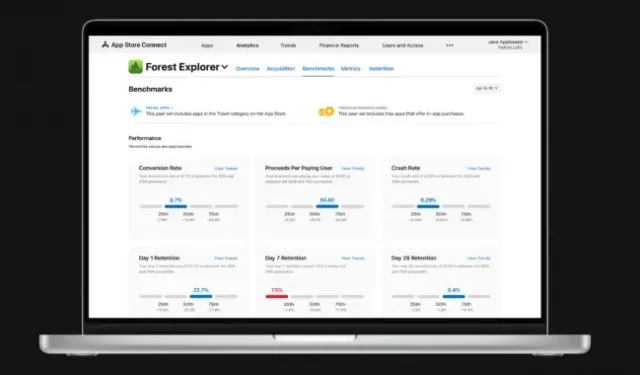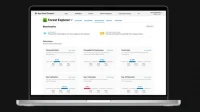Apple has introduced a new way for developers on platforms like the iPhone to track the performance of their apps. This is a new dashboard called Peer Group Benchmarks that shows percentage data about how an app compares against other similar apps on certain metrics.
The new dashboard will appear in App Analytics, a tool already offered through App Store Connect. This is Apple’s portal to a set of services that developers can use to manage their apps across the tech giant’s various app stores.
The metrics tracked in the dashboard include conversion rate, revenue per paying user, bounce rate, and retention, all displayed at weekly intervals. According to a developer support document published by the company, Apple automatically ranks apps according to three criteria.
First, the app is sorted with other apps listed in the same App Store category.
Freemium apps are apps that are free to download but have in-app purchases; premium apps are those that are sold on a pre-paid basis; and paymium apps have both upfront purchase price and in-app purchases. Subscription apps are apps that receive 50 percent or more of their revenue from auto-renewing subscriptions.
Finally, apps are compared to others with a similar download size; Apple sorts apps into low, medium, or high download volume groups based on how many downloads each app has in comparison to other similar apps based on the other criteria listed above, but no more specific math here.
Apple by no means invented this concept of peer group benchmarks; these sorts of comparisons have long been available in premium third-party analytics services sold to app developers.
However, unlike these services, developers won’t have to pay more than Apple’s annual developer account fee to access this data. The toolbar may not be as robust as the competition, but it’s probably a welcome feature for small and growing developers as they may not have the revenue to justify paying for one of the more expensive services. In addition, Apple’s benchmarks can theoretically represent the totality of all apps in the App Store, while third-party solutions can deal with less comprehensive sets of data.
Apple claims that data provided to other developers for comparison purposes is anonymous; only aggregated data will be visible, so developers won’t be able to see exactly how a particular competitor is performing.


